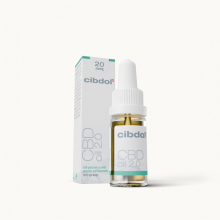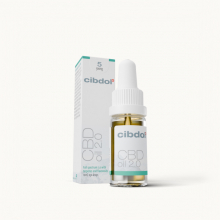What are the disorders of the endocannabinoid system?
Last updated:
Published:
 The endocannabinoid system is a complex network in our bodies that plays a crucial role in maintaining homeostasis, or balance. It regulates various functions, including mood, appetite, pain perception, and more. But did you know that imbalances in this system can lead to various disorders?
The endocannabinoid system is a complex network in our bodies that plays a crucial role in maintaining homeostasis, or balance. It regulates various functions, including mood, appetite, pain perception, and more. But did you know that imbalances in this system can lead to various disorders?
Contents:
- Understanding the Endocannabinoid System
- Common Disorders of the Endocannabinoid System
- Potential Role of CBD in Treating Endocannabinoid System Disorders
- Supporting a Healthy Endocannabinoid System
- Final Thoughts
- Understanding the Endocannabinoid System
- Common Disorders and Symptoms
- Potential Role of CBD
- Lifestyle Factors and Treatment
In this article, we'll explore some of the most common disorders of the endocannabinoid system, their symptoms, and potential treatment options, including the role of CBD.
Understanding the Endocannabinoid System
Before we dive into the disorders, let's briefly understand what the endocannabinoid system is. It's made up of receptors, enzymes, and endocannabinoids (naturally occurring cannabinoids) that work together to maintain homeostasis in the body.
This system interacts with various cannabinoids, including those found in the cannabis plant, like CBD and THC. When these compounds interact with the receptors, they can influence the system's functioning, potentially leading to therapeutic effects.
Common Disorders of the Endocannabinoid System
1. Fibromyalgia
Fibromyalgia is a chronic pain disorder characterized by widespread musculoskeletal pain, fatigue, and sleep disturbances. Research suggests that an imbalance in the endocannabinoid system may play a role in the development of this condition.
2. Irritable Bowel Syndrome (IBS)
IBS is a gastrointestinal disorder that causes abdominal pain, bloating, and changes in bowel habits. Studies have shown that the endocannabinoid system may be involved in the regulation of gut motility and inflammation, which can contribute to IBS symptoms.
3. Migraine
Migraines are severe, recurring headaches that can be debilitating. The endocannabinoid system has been found to play a role in pain modulation and inflammation, both of which are involved in migraine pathophysiology.
Have you ever wondered how CBD might help with these disorders? Well, as a cannabinoid, CBD interacts with the endocannabinoid system and may help restore balance and alleviate symptoms associated with these conditions.

Potential Role of CBD in Treating Endocannabinoid System Disorders
While more research is still needed, there is growing evidence that CBD may be beneficial in managing some of the disorders associated with the endocannabinoid system:
1. Pain Management
CBD has been shown to have analgesic (pain-relieving) properties, which may help alleviate chronic pain associated with conditions like fibromyalgia and migraine. It may also reduce inflammation, another contributing factor to pain.
2. Gastrointestinal Support
CBD has been found to have anti-inflammatory and antioxidant effects, which may help reduce inflammation in the gut and alleviate symptoms of IBS and other gastrointestinal disorders.
3. Mood and Sleep Regulation
Some research suggests that CBD may have anxiolytic (anti-anxiety) and sleep-promoting effects, which could be beneficial for individuals with mood disorders or sleep disturbances associated with endocannabinoid system imbalances.
It's important to note that while CBD shows promise in managing these disorders, more research is still needed to fully understand its mechanisms and potential long-term effects. Additionally, it's always advisable to consult with a healthcare professional before incorporating CBD into your treatment plan.
Supporting a Healthy Endocannabinoid System
In addition to potential therapeutic interventions, maintaining a healthy lifestyle can also support the proper functioning of the endocannabinoid system. This includes practices such as:
- Eating a balanced and nutritious diet
- Engaging in regular physical activity
- Managing stress through techniques like meditation or yoga
- Getting adequate sleep
By taking care of your overall well-being, you may help maintain a balanced endocannabinoid system and reduce the risk of developing related disorders.
Final Thoughts
The endocannabinoid system plays a vital role in maintaining homeostasis in our bodies, and imbalances in this system can contribute to various disorders. While more research is still needed, compounds like CBD show promise in managing some of these conditions by interacting with the endocannabinoid system.
If you suspect you may be suffering from a disorder related to the endocannabinoid system, it's essential to consult with a healthcare professional for proper diagnosis and treatment. Additionally, maintaining a healthy lifestyle can support the proper functioning of this crucial system and potentially prevent imbalances from occurring.

FAQ: Disorders of the Endocannabinoid System
Understanding the Endocannabinoid System
What is the endocannabinoid system, and why is it important?
The endocannabinoid system is a complex network in our bodies that plays a crucial role in maintaining homeostasis, or balance. It regulates various functions, including mood, appetite, pain perception, and more.
How does the endocannabinoid system interact with cannabinoids like CBD?
The endocannabinoid system interacts with various cannabinoids, including those found in the cannabis plant, like CBD and THC. When these compounds interact with the receptors, they can influence the system's functioning, potentially leading to therapeutic effects.
Common Disorders and Symptoms
What are some common disorders associated with the endocannabinoid system?
Some common disorders linked to imbalances in the endocannabinoid system include fibromyalgia, irritable bowel syndrome (IBS), and migraine.
What are the typical symptoms of these disorders?
Symptoms can vary depending on the disorder, but may include chronic pain, fatigue, sleep disturbances, gastrointestinal issues, and headaches.
Potential Role of CBD
How might CBD help manage disorders of the endocannabinoid system?
CBD interacts with the endocannabinoid system and may help restore balance and alleviate symptoms associated with these conditions. It has been studied for its potential analgesic (pain-relieving), anti-inflammatory, and anxiolytic (anti-anxiety) effects.
Is CBD a cure for these disorders?
While CBD shows promise in managing some of these disorders, more research is still needed to fully understand its mechanisms and potential long-term effects. It should be considered a potential therapeutic option, but not a cure.
Lifestyle Factors and Treatment
What lifestyle factors can support a healthy endocannabinoid system?
Maintaining a balanced and nutritious diet, engaging in regular physical activity, managing stress, and getting adequate sleep can all help support the proper functioning of the endocannabinoid system.
Should I consult with a healthcare professional before using CBD for these disorders?
Yes, it's always advisable to consult with a healthcare professional before incorporating CBD into your treatment plan, especially if you have any pre-existing medical conditions or are taking other medications.
Summary:
The endocannabinoid system is a crucial network in our bodies that helps maintain homeostasis, or balance, by regulating various functions like mood, appetite, pain perception, and more. Imbalances in this system can contribute to the development of various disorders. Some of the most common disorders associated with the endocannabinoid system include fibromyalgia, irritable bowel syndrome (IBS), and migraine.
Fibromyalgia is a chronic pain disorder characterized by widespread musculoskeletal pain, fatigue, and sleep disturbances. IBS is a gastrointestinal disorder that causes abdominal pain, bloating, and changes in bowel habits. Migraines are severe, recurring headaches that can be debilitating. Research suggests that the endocannabinoid system plays a role in the pathophysiology of these conditions.
While more research is still needed, there is growing evidence that CBD, a cannabinoid found in the cannabis plant, may be beneficial in managing some of these disorders. CBD interacts with the endocannabinoid system and has been studied for its potential analgesic (pain-relieving), anti-inflammatory, and anxiolytic (anti-anxiety) effects. However, it's important to note that CBD should be considered a potential therapeutic option, not a cure.
In addition to potential therapeutic interventions like CBD, maintaining a healthy lifestyle can also support the proper functioning of the endocannabinoid system. This includes practices such as eating a balanced diet, engaging in regular physical activity, managing stress, and getting adequate sleep. It's always advisable to consult with a healthcare professional before incorporating CBD into your treatment plan.















